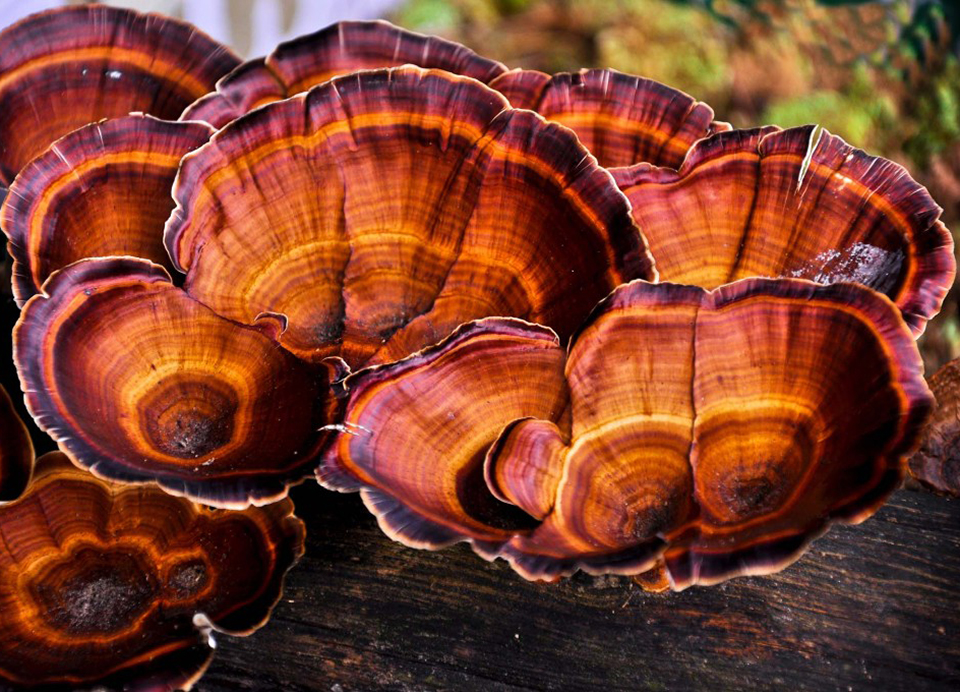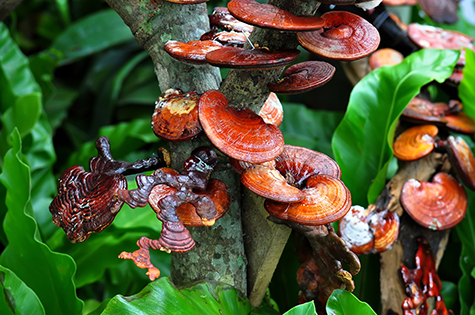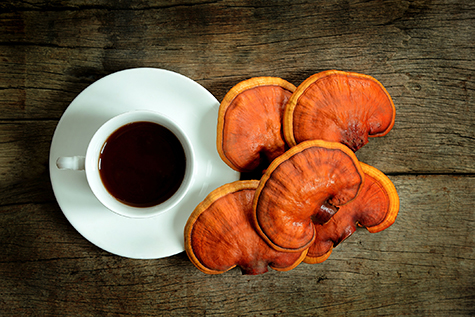Reishi Mushroom: A Cancer-Fighting Hero


Mushrooms are a major FoodTrient food! Both edible and medicinal mushrooms contain FoodTrient properties including anti-inflammatory, antioxidant, immune boosting, and disease prevention effects. Two mushrooms backed by research that contain potent health benefits include Reishi and Turkey Tail mushrooms.
 Reishi mushrooms aren’t something you will find in your local grocery store. Though all mushrooms have health promoting properties including vitamins, minerals, antioxidants, fiber and immune-boosting compounds like beta-glucans, some mushrooms are more edible than others. Reishi mushrooms are made of non-digestible fiber and have a woody texture. More potent health benefits are said to come from young reishi mushrooms rather than older, drier ones. Because of their bitterness, Reishi is often taken in capsule or extract form. These medicinal mushrooms have a long history of use in Chinese and folk medicine but are now gaining popularity in the U.S. due to the body of research that continues to develop about the health benefits associated with Reishi.
Reishi mushrooms aren’t something you will find in your local grocery store. Though all mushrooms have health promoting properties including vitamins, minerals, antioxidants, fiber and immune-boosting compounds like beta-glucans, some mushrooms are more edible than others. Reishi mushrooms are made of non-digestible fiber and have a woody texture. More potent health benefits are said to come from young reishi mushrooms rather than older, drier ones. Because of their bitterness, Reishi is often taken in capsule or extract form. These medicinal mushrooms have a long history of use in Chinese and folk medicine but are now gaining popularity in the U.S. due to the body of research that continues to develop about the health benefits associated with Reishi.
Classification
There are six types of Reishi mushroom but Red Reishi (also called Ganoderma lucidum, Duanwood Reishi or Ling Zhi in Chinese medicine) is the form used in supplements and medicine. Red Reishi mushrooms are considered medicinal or herbal instead of edible, so you will not see Reishi mushroom recipes available. Studies show that these mushrooms are non-toxic and safe to take daily for most people. For medicinal use, the fruiting body, spores, and mycelium is used. Mycelium is the main part of the mushroom, or the body of a fungus that lives inside the wood, straw, and grain of the host.
Health Benefits
Reishi is used to boost the immune system and works as an immune modulator. In Chinese medicine, it is also used as a general tonic for health and balance and as an adaptogen for adrenal support. Learn more about adaptogens here on FoodTrients. There are properties in Reishi mushrooms that block histamines through one of the active ingredients: ganoderic acid which is beneficial because histamines are the cause behind seasonal allergy discomfort including itchy eyes and throat, stuffy and runny noses. Ganoderic acids also provide the antioxidant benefit from using these mushrooms. Reishi contains anti-inflammatory properties and has been compared in some studies to hydrocortisone, showing similar benefits. There is also evidence that Reishi supports neurological or brain health.
 Reishi is also well known for cardiovascular health and anti-cancer properties. There is evidence that Reishi mushrooms can lower blood pressure and even improve the general physical condition of the entire cardiovascular system. Animal studies show that Reishi may stop the body from creating excess cholesterol. Anti-cancer benefits include inhibiting tumor growth and reducing metastasis or the spread of cancer in the body) likely due to the way they stop tumors from developing their own blood supply and through stimulating the immune system which supports the body’s natural defenses. Reishi mushroom extracts also show promising effects when giving during chemo and radiation and have been studied with a particular interest in breast, lung and prostate cancers.
Reishi is also well known for cardiovascular health and anti-cancer properties. There is evidence that Reishi mushrooms can lower blood pressure and even improve the general physical condition of the entire cardiovascular system. Animal studies show that Reishi may stop the body from creating excess cholesterol. Anti-cancer benefits include inhibiting tumor growth and reducing metastasis or the spread of cancer in the body) likely due to the way they stop tumors from developing their own blood supply and through stimulating the immune system which supports the body’s natural defenses. Reishi mushroom extracts also show promising effects when giving during chemo and radiation and have been studied with a particular interest in breast, lung and prostate cancers.
One of the major health benefits of all mushrooms, including Reishi is their beta-glucan content. Beta-glucans are a form of polysaccharide or complex carbohydrate component of the cell wall of mushrooms that has been linked to enhancing natural killer cell function and inhibit tumor cell growth. In other words, beta-glucans support the immune system and have anti-cancer benefits. Beta-glucans are components of all medicinal mushrooms that are strongly linked with human health benefits.
Dosing and Safety
Due to the range of available Reishi products and a variety of preparations, there are studies that show a range of 200 mg-2 grams capsules taken between once and five times per day can reduce inflammation and enhance the immune system. Traditionally, higher levels are used and 1.5-9 grams of dried mushroom, 1-1.5 grams of powder, or 1mL per day of tincture has been studied. In cardiovascular studies, 5.4 grams per day improved chest pain, heart palpitations, and shortness of breath in patients with these cardiovascular symptoms. Given the range of doses studied, it is best to meet with a certified herbal specialist to determine what may be right for you. A supplement should include around 10% or more of beta-glucan. Keep in mind that Reishi may have a tranquilizing effect on some people and is sometimes used to improve sleep. A negative reaction to Reishi may produce symptoms like oral dryness, itching, stomach upset or nosebleeds. As always, be sure to check with your medical team to ensure that Reishi mushrooms are safe for you and will not interact with any other medication or conditions you may have. There are known interactions with medications, herbs or supplements that thin the blood, or decrease blood pressure or blood sugars.
References not embedded in the article:
Dragon Herbs Reishi: http://www.dragonherbs.com/products.asp?dept=46
Medicinal Mushrooms the essential guide by Martin Powell. 2013 Mycology Press
MycoMedicinals: an informational treatise on mushrooms by Paul Stamets. 2002 Mycomedia Productions.